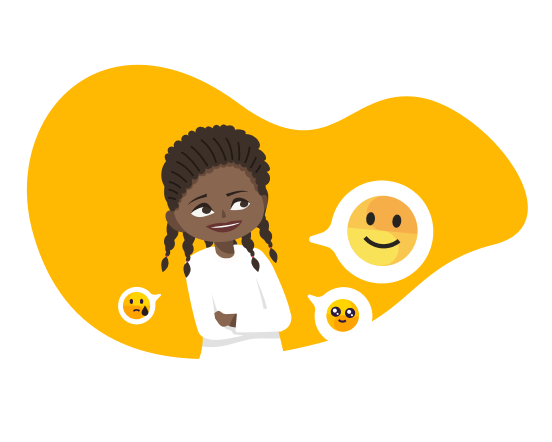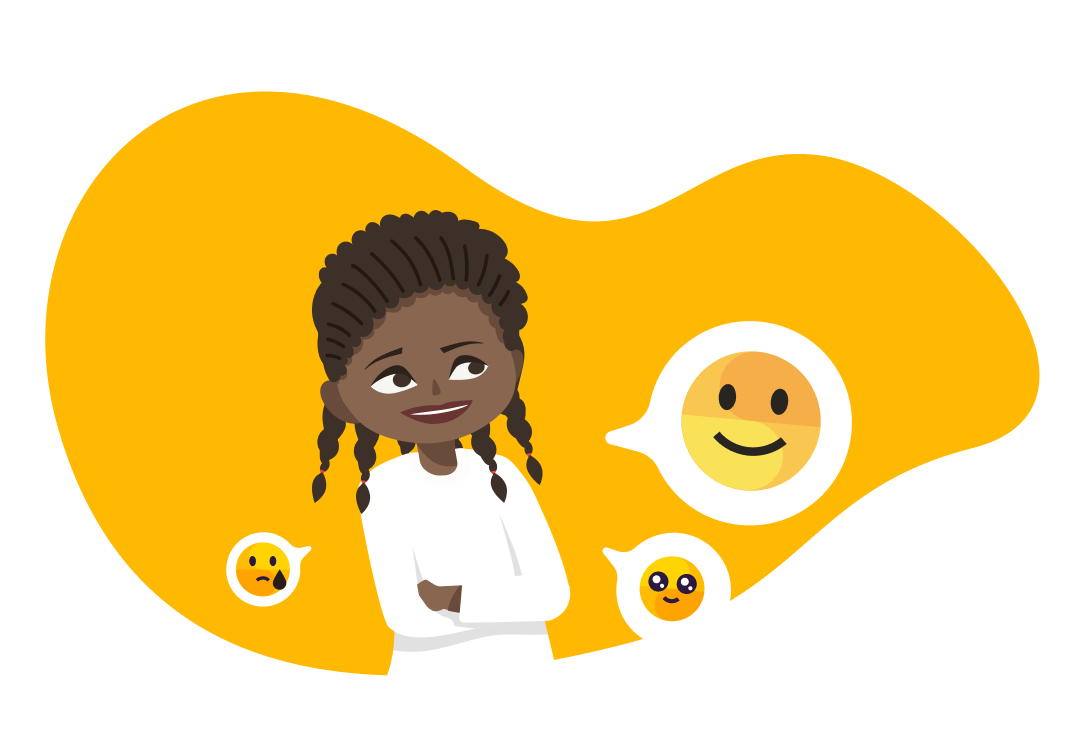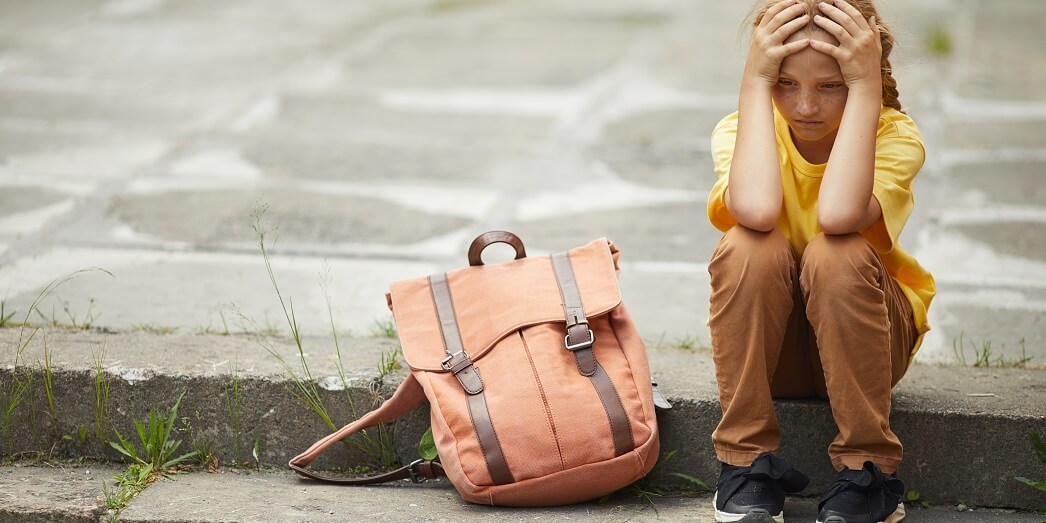
How to help your child with bullying
Today, bullying is one of the most pressing problems encountered in schools and other children’s groups. It is this problem that causes a lot of discussions since “bullying” entails various negative consequences. Indeed, as a result, the manifestation of child aggression leads not only to a decrease in academic performance but also depression, mental disorders, and even suicide.
What is bullying?
Bullying refers to mockery and regular abuse of a child. This can be psychological and/or physical. In this form of conflict, three participants are distinguished: the victim, observers, and the bully himself.
The main goal pursued by bullies is to suppress the individuality and personal traits of another child. Such conflicts occur in the presence of numerous people. Emotionally weaker children are usually chosen as a victim.
According to various sociological studies, from 36 to 51% of high school students faced bullying and bullying in educational institutions. The most common form of conflict is insults (77% of cases). Further, aggression in the form of humiliation is very common (61% of cases), and physical violence in 24% of cases. In almost 11% of cases, everything that happens is recorded on a smartphone camera.
The most common forms of psychological bullying include the following:
- spreading gossip and false information;
- verbal abuse (obscene statements, cruel jokes, ridicule);
- boycott (considered the most dangerous manifestation of an attitude towards a child, often leading to suicide).
Why do children bully others?
When adults discuss the reasons and motives for such behavior of children, this discussion usually goes into the area of ”Is the victim to blame or not?” This is especially evident in the dialogue of people who are not familiar with pedagogy and psychology basics. However, in most cases, the child who is chosen as a victim is innocent.
It is important to understand that the victims are children who show their individuality and those who have mental or physical features. These can be physical disabilities (for example, stuttering, scars on the face), low academic performance, sexual orientation, and so on.
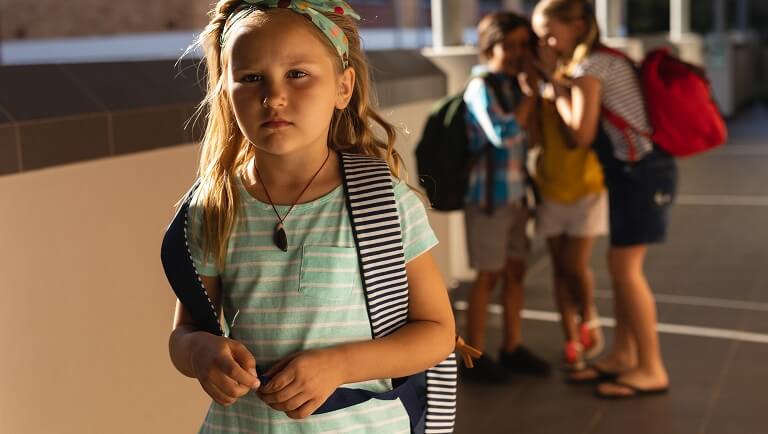
When identifying the reasons for bullying, it is important to consider that literally every conflict can lead to serious negative consequences. A minor quarrel is often just an episode of a major conflict that lasts a long time.
Signs that a child is being bullied
Children are often silent about their problems, trying to resolve conflicts on their own. However, psychologists identify signs that eloquently confirm the fact of child abuse. These include:
- Physical damage and injury, especially when they appear on the body of a child very often.
- Frequent disappearances, loss, or damage to the child’s personal belongings (textbooks, clothing, gadgets).
- Child refusal to go to school, meet friends, attend social events.
- An unexplained and abrupt change in behavior (increased attachment to parents, severe anxiety, unwillingness to do normal daily activities).
- Frequent mention of loneliness, isolation, and secretive behavior.
- Unreasonable aggression against weaker (younger) children.
- Impaired concentration of attention, a sharp decline in academic performance.
- Complaints about physical condition without obvious medical reasons (sleep disturbances, frequent headaches, problems with the digestive system).
- Dissatisfaction with things and events that previously suited the child (place of residence, appearance, physical fitness).
- Behavior leading to trauma, talking about the desire to commit suicide.
- Or you may just talk to your son or daughter.
Which children are more likely to be bullied?
There are several main characteristics that increase the likelihood of a child being bullied:
- untypical appearance — excessive fullness or thinness, skin diseases (psoriasis, large birthmarks, acne), race, etc.;
- untypical behavior — expressing a point of view that differs from the one that most of the team adheres to;
- speech defects — poor balance, burr, stuttering;
- high or low level of intelligence — very good academic performance or critical academic failure;
- insufficient physical fitness — lack of the ability to run quickly, jump high or push up from the floor;
poverty; - other characteristics.
Simultaneously, all attempts of the victim to divert the buller’s attention from himself usually end in a fiasco. Even if a child has managed to lose weight, this is not a guarantee that he will cease to be the object of bullying. The bully’s purpose is to mock a specific person to gain emotional satisfaction and consolidate his authority in the eyes of the class.
How does bullying affect a child?
Every child can become an object of bullying in a children’s team, regardless of the family’s level of development and well-being. Parents mustn’t ignore such conflicts, even when the aggressive behavior is not directed specifically at their child.
For children who have gone through the collective enmity, this experience remains in the memory for the rest of their lives. How severe the psychological trauma will be, whether it will cause communication problems in the team in the future, or whether it will require regular consultations with a psychologist, directly depends on the parents’ reaction and actions.

In most cases, psychological pressure turns into a phase of physical violence. As a result, many complexes are formed in the victim. Children begin to sincerely believe that something is wrong with them. Such an attitude towards themselves is regarded as a well-deserved punishment. If the parents do not intervene in the conflict in time, this is fraught with the development of various phobias, depression, and mental disorders, often leading to suicide.
Children-aggressors also receive psychological trauma, and their academic performance drops sharply. For them, reality ceases to exist with harmonious relationships and communication in a team. The main purpose of each visit to the school is to bully the selected student. As a result, this leads to the development of criminal inclinations, resulting in more serious crimes in adulthood.
Eyewitnesses of bullying, observing what is happening, are afraid to be in the victim’s place. This fear leads to the fact that “observers” take a buller position, and in the family — they are often silent about what is happening at school. Also, eyewitnesses feel guilty that they could not prevent bullying.
What should parents do when faced with bullying?
It all depends on whether the parents are faced with bullying against their child or defend their child-aggressor. In different situations, you need to act in different ways, but in both cases, you need to talk to the child in order to:
- listen to the child’s point of view and let him/her know that he has support from the family;
- convince him that they believe him and everything must be resolved;
- listen to the class teacher and the headmaster;
- collect evidence, including testimony from classmates;
- prepare a complaint addressed to the director and the juvenile affairs inspector, to the prosecutor’s office, the education department, and other instances.
It’s important to give the case a resonance. This will speed up the process of deciding who is right and who is wrong. Most importantly, it will help punish the culprit and prevent further bullying in the institution.
How to prevent bullying?
To prevent bullying or aggression from your child towards other children, you need to develop the following five basic emotional and social skills in your child from childhood:
- Emotion control — every child has feelings, but not all children can control them, which manifests itself not only in the form of aggression towards others but also in the form of tears, clenching of fists, tremors in the body. Parents should teach their child to manage their emotions using different methods and techniques.
- Empathy is the ability to understand how other people are feeling in certain situations. If you develop a sense of empathy in a child, he will relate to his peers in a different way. For bully children, empathy can help them understand how their potential victims feel when they are humiliated.
- Conflict Resolution — disputes and disagreements are an integral part of human relationships. Therefore, you should not protect the child from entering into a conflict. It is better to teach him how to resolve conflict situations correctly, using the skills of persuasion.
- Self-confidence allows you to express your opinion without resorting to accusations and threats. By developing a sense of confidence in the child, parents help him effectively and conflict-free interact with the people around him.
- The ability to make friends — many children make friends without any problems, but some find it difficult to do so. Therefore, it is important not only to teach the child to be friends but also to choose the right friends on whom he can count on in difficult situations.
How to protect your child from bullying?
In such a situation, not only the child but also his parents are under attack. Changing the situation will require tremendous effort and patience from you. Start with the following steps:
- When you hear about a bullying case, try to stay calm.
- Contact the school and keep in touch with the principal at all times, as the increased parenting emphasizes the importance of the situation and encourages concrete action.
- If you are ready to play hard, collect the evidence base (photos and videos, testimony of witnesses). It will not be superfluous to consult with a psychologist. This can be useful if the case is going to be considered in court. If during the proceedings you believe that your child is being threatened, intimidated, in danger, it is better to take your kid to distance learning during this time.
- Then, if the situation remains in the same place, the school administration does not take any action — file a complaint with a higher authority, and also write a statement to the police and contact a lawyer.
These are all tough methods of struggle. Unfortunately, they can make things worse. You risk ruining your relationship with your parents and teachers. Your child is more likely to continue to be bullied then. The only difference is that you will sue for compensation for this.
In fact, the easiest way to solve the problem is to simply change the school.
What to do if your child is bullying others?
Parents whose children are prone to showing aggression, rage, and anger towards other children need to learn to perceive them in such states. Simultaneously, one should say out loud what kind of emotion the child is currently experiencing. It is also important to identify the reason for this behavior, offer your help and support.
If a buller has a low sense of empathy but at the same time has high self-esteem and self-confidence, he is aware of his actions. Such children need to establish strict boundaries of what is permissible and explain how their actions can turn out. Parents need to talk frankly with their child and talk about their own experiences as an aggressor or a victim.
It is worth taking a closer look at the people who surround the child. It is possible that he is constantly abused by high school students. If possible, the child should be protected from communication with such people.
Several studies support the fact that adolescents become more aggressive when they play violent computer games. While such claims are highly controversial, parents must control the amount of violent content their child views or enjoys.
What should a child do if he sees that other children are bullying someone?
In psychology, eyewitnesses to bullying other children are called “observers”. In the absence of the ability to cope with the experience of violence occurring around them, such children are “traumatized by the observer”.
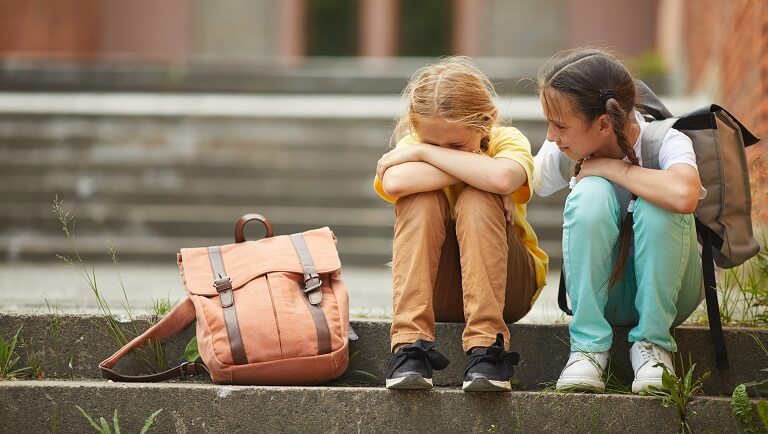
To prevent this from happening, you need to talk to the child and bring him to an open conversation. If a friend is being bullied, you need to explain to the child that he should not be left on the sidelines.
Having the support of his family, the child will be able to confidently tell the victim that he will help to cope with the current situation — his friend will not be left alone with the offenders.
The child must utter these words at the moment when the offenders of his comrade are nearby. Such publicity often helps prevent bullying from continuing. After all, bullers understand that their behavior is already known to the defender’s parents, and the whole school will know.
How to help your child regain self-confidence after being bullied?
- Encourage the child to spend time with those children in whose company he feels comfortable and safe.
- Trust the child if he seeks to resolve a conflict on his own.
- Ask how the child’s day went, what was interesting.
- Find activities that you can participate in together.
- Reassure your child that you will do your best to exclude him from participating in such conflicts.
To sum up
Every child can become an object of bullying, regardless of intelligence, physical characteristics, or financial situation. And if you find out about cases of bullying at the school where your child is studying, do not let the situation take its course. Be sure to discuss it with other parents and teachers to find the best solution to the problem.
Talk to your child about bullying and explain what to do if other children abuse him or his classmates. Develop a sense of self-confidence and empathy in your child so that he can control his emotions, understand the feelings of others, and do not become an aggressor.

new engaging articles


